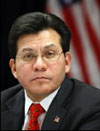|
|
|
Gonzales gave firing authority to aides
Breaking Legal News |
2007/05/02 06:28
|
| An internal US Department of Justice order disclosed Monday by the National Journal gave two top aides to Attorney General Alberto Gonzales wide discretion to fire and hire political appointees within the Department who were not subject to Senate confirmation. The memo, dated March 2006, authorized then-Gonzales chief of staff D. Kyle Sampson and Gonzales's White House liaison, a post later filled by Monica Goodling, "to take final action in matters pertaining to the appointment, employment, pay, separation, and general administration" of almost all non-civil service DOJ employees. Sampson and Goodling both resigned earlier this year in the midst of controversy over their roles in the firings of eight US Attorneys for allegedly political reasons. An early version of the March order had authorized the officials to act without even having to consult the Attorney General, but the wording of the instrument was later revised at the urging of the DOJ Office of Legal Counsel, which was concerned about the constitutionality of such broad-brush delegation of power. An unnamed "senior executive branch official" quoted by the National Journal said of the order that it was "an attempt to make the department more responsive to the political side of the White House and to do it in such a way that people would not know it was going on." Senate Judiciary Committee Chairman Patrick Leahy (D-VT) expressed similar concern over the root strategy apparently reflected in the order, saying in a statement Monday: This development is highly troubling in what it seems to reveal about White House politicization of key appointees in the Department of Justice. The mass firing of U.S. attorneys appeared to be part of a systematic scheme to inject political influence into the hiring and firing decisions of key justice employees. This secret order would seem to be evidence of an effort to hardwire control over law enforcement by White House political operatives. Leahy called for the order and its supporting materials to be formally turned over to the Senate and House Judiciary committees looking into the US Attorney firings. |
|
|
|
|
|
|
Class action or a representative action is a form of lawsuit in which a large group of people collectively bring a claim to court and/or in which a class of defendants is being sued. This form of collective lawsuit originated in the United States and is still predominantly a U.S. phenomenon, at least the U.S. variant of it. In the United States federal courts, class actions are governed by Federal Rules of Civil Procedure Rule. Since 1938, many states have adopted rules similar to the FRCP. However, some states like California have civil procedure systems which deviate significantly from the federal rules; the California Codes provide for four separate types of class actions. As a result, there are two separate treatises devoted solely to the complex topic of California class actions. Some states, such as Virginia, do not provide for any class actions, while others, such as New York, limit the types of claims that may be brought as class actions. They can construct your law firm a brand new website and help you redesign your existing law firm site to secure your place in the internet. |
Law Firm Directory
|
|





